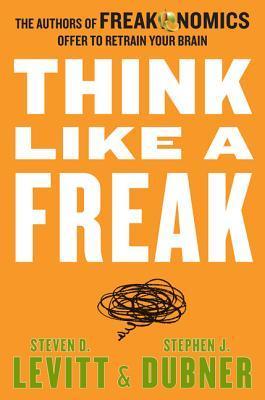
Think Like a Freak
Steven D. Levitt, Stephen J. Dubner
About the Author

Steven D. Levitt
Questions & Answers
Unconventional thinking and economic analysis can lead to innovative solutions by challenging conventional wisdom and focusing on incentives. By analyzing incentives, we can understand how people and systems behave, often revealing hidden motivations and unintended consequences. This approach allows for:
-
Identifying root causes: Economic analysis can help pinpoint the underlying causes of complex problems, rather than just treating symptoms. For example, addressing poverty requires understanding economic and social institutions, not just distributing aid.
-
Exploring incentives: By understanding what motivates individuals and organizations, we can design better policies and interventions. For instance, using incentives to encourage recycling or reduce crime can be more effective than punitive measures.
-
Using data and experiments: Economic analysis relies on data and experiments to test hypotheses, which can lead to evidence-based solutions. This approach can be particularly useful in complex issues like education or healthcare.
-
Challenging assumptions: Unconventional thinking encourages questioning established beliefs and norms, which can open up new possibilities for problem-solving. For example, rethinking the role of parents in education reform can lead to more effective educational policies.
By combining these elements, unconventional thinking and economic analysis can provide innovative solutions to complex problems, often leading to more effective and efficient outcomes.
Incentives significantly shape human behavior by influencing decisions and actions. They can be leveraged to achieve desired outcomes by aligning individual interests with collective goals. For instance, financial incentives like bonuses can motivate employees to work harder, while moral incentives can encourage altruistic behavior. However, incentives must be carefully designed to avoid unintended consequences, such as the "cobra effect," where incentives lead to the opposite of the intended behavior. Understanding the true incentives of individuals and adjusting them to align with desired outcomes is crucial for successful implementation. This can involve using non-financial incentives, like social recognition or changing the relationship framework, to encourage the right behaviors.
Data and empirical evidence can challenge conventional wisdom and reveal hidden truths by:
- Objective Analysis: Data provides an objective lens to analyze situations, free from personal biases or preconceived notions.
- Correlation vs. Causation: It distinguishes between correlation and causation, helping to understand if one event truly causes another.
- Root Cause Identification: By examining data, one can identify the root causes of problems, rather than just treating symptoms.
- Evidence-Based Decisions: It supports decisions with factual information, rather than relying on intuition or tradition.
- Validation of Hypotheses: Data can validate or invalidate hypotheses, leading to new insights and understanding.
- Cross-Validation: Multiple data sources can be used to cross-validate findings, increasing confidence in conclusions.
- Storytelling: Data can be used to tell compelling stories that illustrate complex ideas, making them more accessible and persuasive.
Thinking like a "Freak" can be challenging due to several potential downsides and challenges:
- Out-of-Step Views: A "Freak" might hold unconventional views that conflict with mainstream opinions, leading to social isolation or conflict.
- Misunderstandings: People may misinterpret or misrepresent "Freak" thinking, leading to misunderstandings or negative reactions.
- Data Overload: Analyzing data can be overwhelming, and misinterpretation of data can lead to incorrect conclusions.
- Resistance to Change: People may resist unconventional solutions, making it difficult to implement "Freak" thinking in practice.
To navigate these challenges:
- Stay Open-Minded: Be willing to listen to others and consider different perspectives.
- Communicate Clearly: Explain your reasoning and data-driven approach to avoid misunderstandings.
- Focus on Evidence: Base conclusions on solid data and logical reasoning.
- Be Patient: Understand that change takes time and persistence.
The book "Think Like a Freak" offers insights that can be applied to both personal and societal problems to foster positive change. On a personal level, the book encourages embracing curiosity and questioning assumptions, which can lead to better decision-making and problem-solving. It emphasizes the importance of understanding incentives, recognizing that our own self-interest can sometimes conflict with the greater good. This understanding can help individuals make more rational choices and avoid common pitfalls like the sunk-cost fallacy.
On a societal level, the book's approach can lead to more effective policies and reforms. By focusing on root causes rather than symptoms, society can address complex issues like poverty, crime, and education more effectively. The book also advocates for the use of data and experimentation to test solutions, which can lead to more evidence-based decision-making. Additionally, the book encourages the willingness to challenge conventional wisdom and embrace unconventional solutions, which can lead to innovative and effective changes. By fostering a culture of open-mindedness and critical thinking, "Think Like a Freak" can contribute to positive societal transformations.